Ginger Beer - homemade and budget-friendly
This delicious recipe was given to me by a good friend I met online (when I dug into her genealogy I found that we were related by marriage, true story!), who has kindly allowed me to share her refreshing family secret (I don't know who originally developed this, but it works well - kudos to those ancestors).
It is a recipe you have to have patience with, because it takes time ... as all good things do. It is in two parts - making the bug, then bottling - or 3 parts if you include (im)patiently waiting for it to mature.
The steps may seem daunting at first, but I promise that when you've been through the process once you'll find it so much easier to repeat. Also, I learned the hard way how it important it is to be careful to sterilise everything properly. That was a batch wasted.
Part One - Starting the Bug
Ingredients
- a clean glass jar (no lid required, but needs to hold more than 1 cup's worth of liquid)
- 1x teaspoon ginger (ground)
- 2x teaspoons sugar (white)
- measuring teaspoon
- cloth (for covering jar)
- 1 cup of water (boiled, but cooling)
- 2x teaspoons yeast (compressed; I use breadmaking yeast with no problems)
Instructions
- sterilise the jar before beginning (I do this by swishing a bit of boiling water all around in it; tip out)
- put the water into the jar
- add the sugar, ginger, and yeast; stir to dissolve
- set aside, cover with the cloth
- for the next 7 days, feed it 1x tsp ginger and 1x tsp sugar, stirring gently (I find a figure 8 pattern to be most useful)
Make a note of the feeding schedule, so you don't miss any days, and try to feed it at around the same time so there is an approx. 24 hour gap in between. This is the one I drew up (excuse the bad handwriting but I didn't know then I'd be photographing and posting it) and tacked to the wall above my kitchen sink. The extra ticks on day 7 were because circumstances prevented me from bottling it then, so I just kept feeding it until I could move on to the next stage.
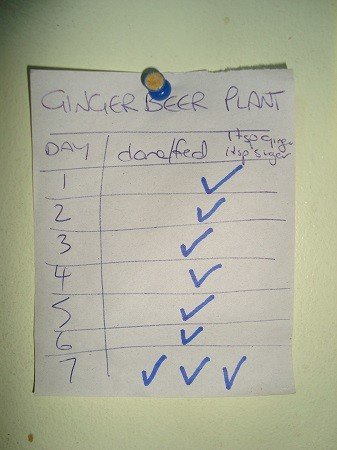
This is what the bug will look like after its week of feeding. This batch will not have as much fermented power as any subsequent bugs you make from it, and with those ones you might see more significant bubbling-up action during their feeding week. You can see some ginger sediment sitting at the bottom.
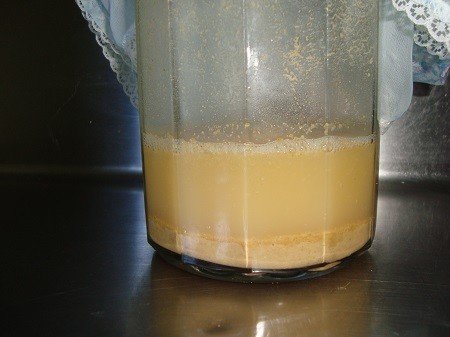
Part Two - Bottling the Beer
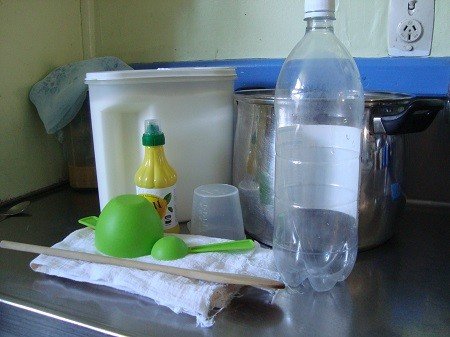
Equipment & Ingredients
- stock pot (which holds more than 6 litres of liquid)
- measuring cup
- pouring/ladling cup
- tablespoon
- wooden spoon
- muslin (or other suitable straining cloth)
- cord to hold cloth in place over the pot
- lemon juice (either 2x squeezed lemons, or 6 tbsp concentrate)
- sugar (3 cups)
- 5 sterilised bottles (must have tight lids to withstand pressure; soda bottles are fine - mine held 1.5lt each)
- funnel
- boiled water (lots)
Instructions
- sterilise the bottles (I do this by pouring a bit of boiling water inside each and screwing the caps on tightly before gently rolling the water around so it touches every internal surface - the heat may distort the plastic slightly but that is okay; it also makes the bottles really hot to handle so be careful)
- put the muslin over the stock pot (tie in place, allowing a slight dip in the centre)
- tip the bug into the muslin, allowing all the liquid to drain into the pot; you may need to gently push it through with the spoon; squeeze remaining liquid out; set aside the leftover bug (this is what will continue the next batch); no, it doesn't look particularly photogenic but that's okay, we'll still love it. The leftover bug will have a crumbly texture.
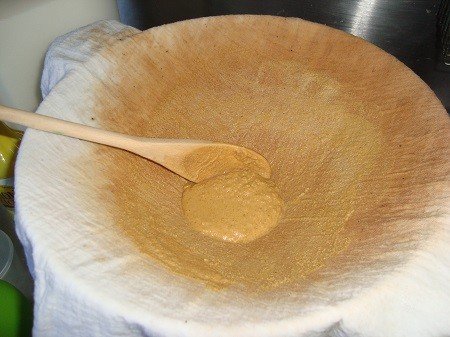
- into the stock pot now add the sugar, and 4 cups of boiling water; stir until the sugar is dissolved
- add the lemon juice; then 5 litres (20 cups) of water (I used boiling, as I wanted to make sure the process was sterilised properly); stir well
- let it cool a bit before bottling (keep it covered), or carefully begin to bottle while still hot
- take the funnel, and a cup for ladling, then slowly pour the liquid into each bottle, making sure to leave a good few inches at the top for expansion (or the bottles really might explode); screw the lids on tightly (if you pour the same amount into each bottle you may need to top up with a bit more water; otherwise the last bottle will hold less)
- add labels to the bottles with the date so you can keep track of when each batch should be ready; store the bottles somewhere out of direct sunlight
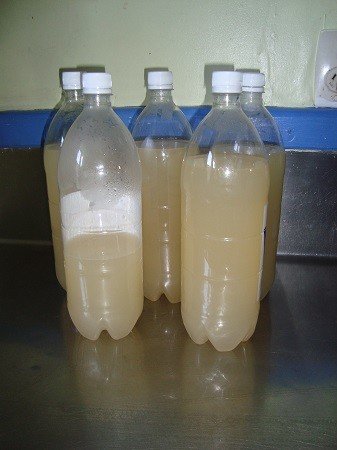
If you want to keep the bug going, halve the 'brick' that was left over. You can either get two bugs going from this (which means double the amount you'll be bottling next time) or find someone to give the spare one to. I decided to go for the double option. My collection of large-sized Vegemite jars are perfect for this job (although I didn't need the lids).
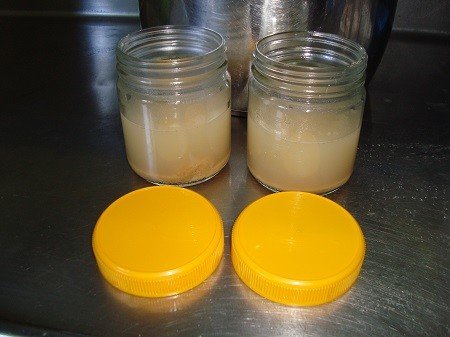
You simply repeat the initial bug-making step, minus the yeast.
Remember to start another feeding schedule, like this one (note it is much neater. Okay, slightly neater).
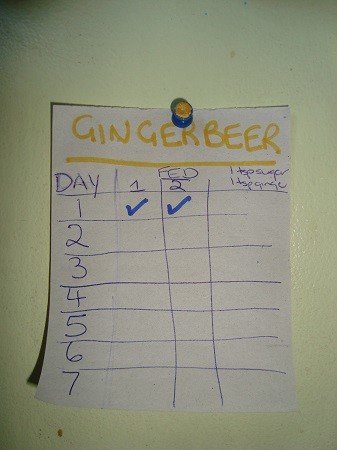
Part Three - Waiting
Yes, this is the most difficult part of the whole process. The continued fermenting and subsequent fizzyness of the drink kicks in during this time. You need to wait at least a month. Sorry, but yes you really will. During this time, if you gently squeeze the bottles you should begin to feel a tightness as the created carbon dioxide expands inside. This is also why you need to have really, really tight lids on those bottles.
The lengthy waiting time is another good reason to continue brewing new batches each week, because once you've tasted it (fingers crossed it turned out well) you will want to scoff it down.
But the only way to truly know it is ready, is to do a taste test. You will likely still see a bit of sediment in the bottom of the bottles but that is nothing to worry about. Tipping a bottle gently upside down should produce the carbon bubbles you've been waiting for, plus there should be the hardness to the bottles from that pressure build-up. So when the month is up, crack a bottle open and have yourself a taste.
Cheers! ![]()
My daughter @kiwisims and I have a friendly rivalry going with the ginger beer as she found a different recipe to make; and as it only takes 3 days to process before drinking she thinks it is far better. Perhaps she will share her version too. I like to think that I am creating quality over quantity though. :D
Brought to you by ...

(graphic courtesy of @kiwisims)

Might try making this over the winter :)
I have my old brewing equipment just sitting in the basement collecting dust, I might just have to put it to use with your recipe! I do enjoy a good Ginger beer! Thanks so much for sharing. BTW, I am a curator with @ocd and would love to nominate your post!
This gem of a post was discovered by the OCD Team!
Reply to this comment if you accept, and are willing to let us share your gem of a post! By accepting this, you have a chance to receive extra rewards and one of your photos in this article may be used in our compilation post!
You can follow @ocd – learn more about the project and see other Gems! We strive for transparency.
Let me know if you have any questions regarding the project or nomination. Hope to hear from you soon!
If you would like your posts to be resteemed by @ocd to reach a bigger audience, use the tag #ocd-resteem. You can read about it here.
Thank you, I would love the chance to be nominated. Much appreciated!
I am glad you like the post, and I hope you do dust off the equipment and brew yourself some fine ginger beer. :)
calling @OriginalWorks
thanks
The @OriginalWorks bot has determined this post by @ravenruis to be original material and upvoted it!
To call @OriginalWorks, simply reply to any post with @originalworks or !originalworks in your message!
All hail our fermenting overlords the Yeast !!
If I remember correctly there are a few studies that pretty much prove mankind handed the world to Yeast and it's ilk, as they are some of the most abundant microbiota in the world due to our care at cultivating them and spreading them about for our own proposes.
Really? Well, better they take over the world than the fungi I say!. lol
I will have to try this. I make a lot of different wine and we make our own beer, but I have never made ginger beer. Sounds like a lot of fun.
It certainly is, but I've found (after waiting and waiting for the bottles to do their thing) that some issues have cropped up in various bottles. This has been really disappointing; but I've had a few good bottles so far - although they've turned out to be a little more .... erm, potent than expected!
I really need to find a source of good, cheap glass bottles as I've had problems with some of the plastic soda bottles I've (re)used.